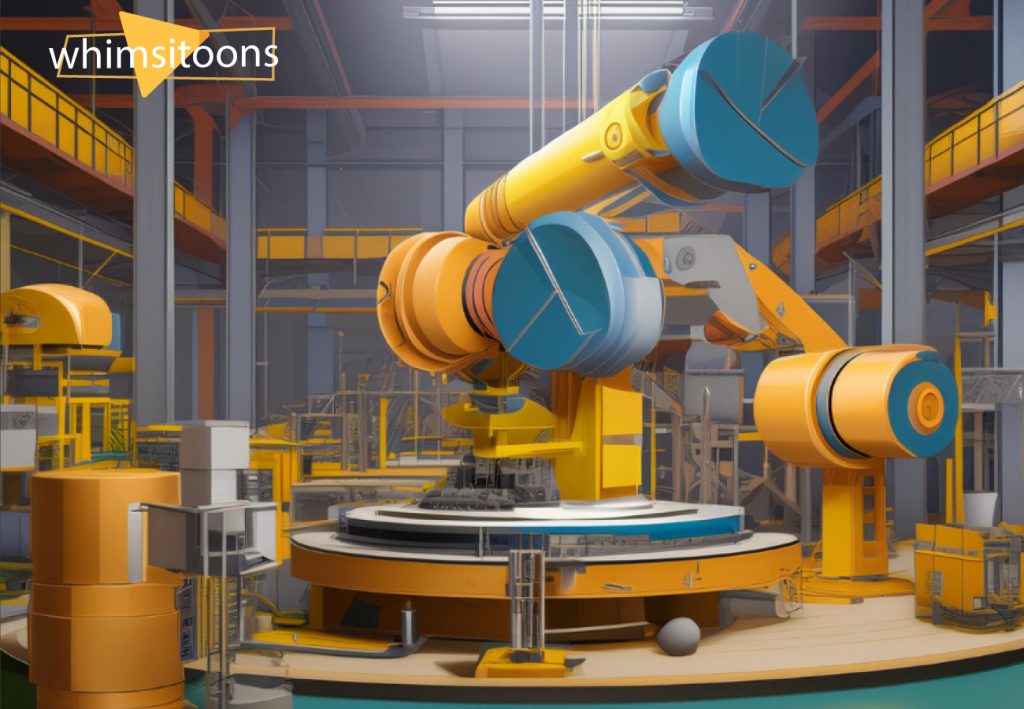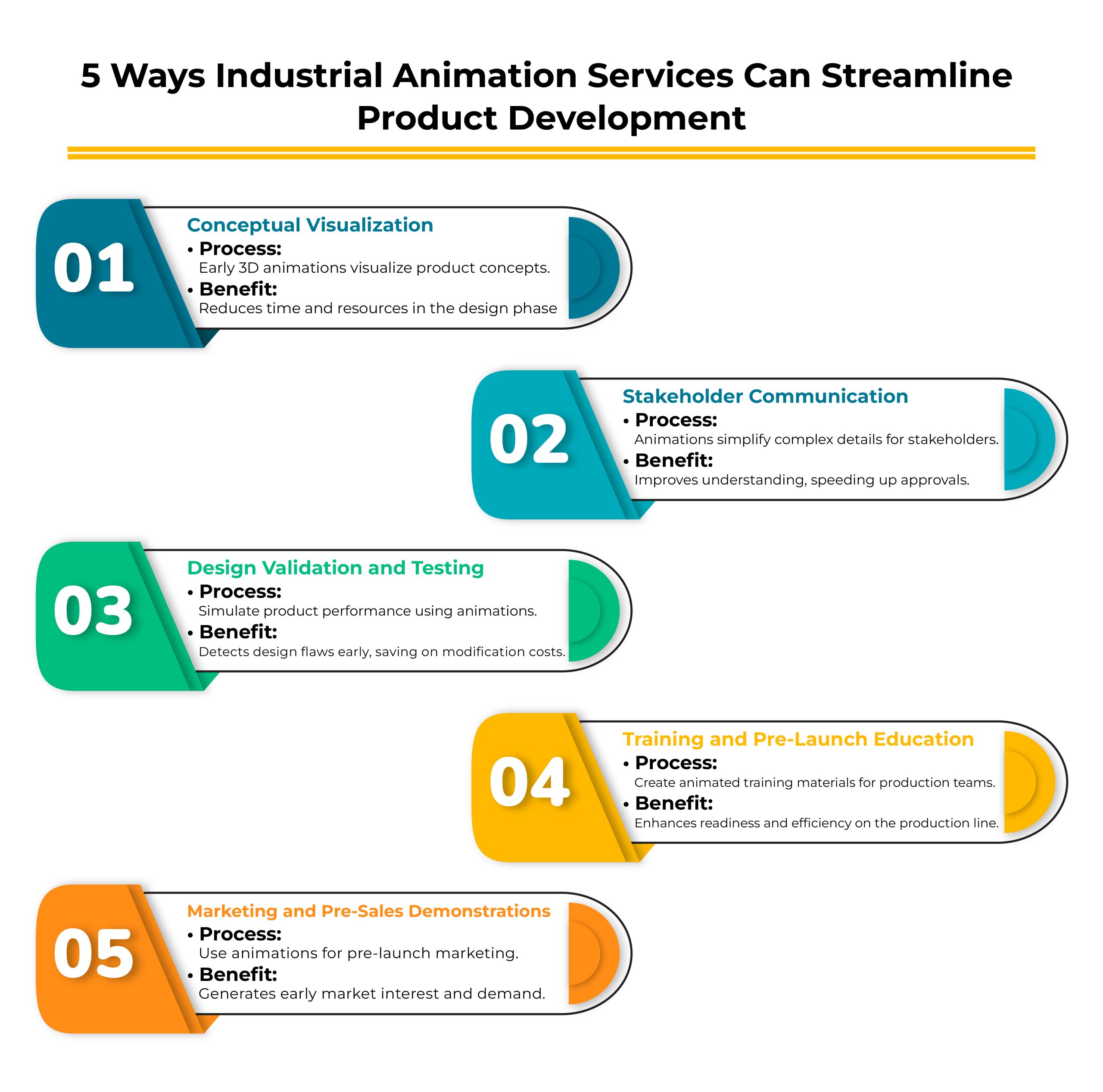Comprehensive Guide to Using Industrial Animation Services

Staying ahead of the competition often means embracing innovative technologies in the growing industrial market. Among these, industrial animation services stand out as a transformative tool.
These services offer a dynamic way to present complex processes, products, and ideas in an understandable and visually engaging format.
Explore how using these animations can improve your business operations and marketing strategies in this Whimsitoons guide.
The Essence of Industrial Animation Services
Industrial animation is a complex fusion of art and technology meant to improve comprehension and involvement, not only about producing beautiful images.
Whether in manufacturing, engineering, or any form of product development, animations can help bridge the communication gap between your creations and clients.
What Makes Industrial Animations Stand Out?
- Clarity in Communication: 3D modeling and industrial process animation simplify complex machinery and processes.
- Enhanced Marketing Appeal: Animated videos can catch the eye of potential customers more effectively than static images or text.
- Training and Safety: Animations can serve as educational tools for training employees, showcasing safe practices without the risk associated with real-life demonstrations.

Real-World Use of Industrial Animation for Different Industries
Manufacturing
- Assembly Line Animations: Visualize the step-by-step process of assembly lines to improve understanding and efficiency, along with machine installation animation services to ensure proper setup.
- Product Testing Simulations: 3D machine animation services allow you to demonstrate a product’s performance under different conditions without the need for physical trials.
Engineering
- Project Visualization: 3D animations can help stakeholders watch projects before physical work begins, facilitating better planning and decision-making.
- System Integration Demonstrations: Show how various systems work together within a facility, helping troubleshoot and maintain.
Energy
- Renewable Energy System Explanations: Use animations to illustrate complex renewable energy systems, such as how wind turbines or solar panels generate power.
Healthcare
- Medical Equipment Demos: Detailed animations can showcase the inner workings of medical devices, promoting understanding among healthcare professionals and investors.
Advantages of Industrial Animation Services
Here’s a concise breakdown of why these machine installation animation services are increasingly becoming a staple in industry communications and marketing strategies:
| Benefits | Description |
| Improved Engagement | Animations grab attention more effectively than static media. |
| Better Retention | Viewers retain visual information longer than text. |
| Versatile Usage | Useful in marketing, training, and operational contexts. |
| Cost Efficiency | Reduces the need for physical models and prototypes. |
Enhancing Your Business with Advanced Visual Tools
- Increased Sales: By providing clear and engaging product demonstrations, animations can help boost sales conversions.
- Customer Satisfaction: Customers appreciate understanding exactly what they’re buying and how it works, leading to higher satisfaction rates.
Challenges in Implementing Industrial Animation
Even as industrial animation has several advantages, such as better training possibilities and increased consumer involvement, businesses must overcome several obstacles before using this technology in their daily operations.
Understanding these challenges is crucial for a smooth transition and effectively utilizing industrial animations.
High Initial Investment
One of the primary barriers to adopting industrial animation is the cost associated with its development.
Creating detailed and accurate animations requires both advanced software and skilled animators.
These initial costs can be prohibitive for many small to medium enterprises (SMEs).
However, the long-term ROI, including reduced training costs and enhanced marketing effectiveness, often justifies this upfront investment.
Technical Expertise
The development of high-quality industrial animations demands a high level of technical expertise.
Specialists industrial animation company in 3D modeling, animation, and graphic design must collaborate closely to produce accurate and visually appealing results.
Finding and retaining such talent can be challenging, especially in regions with a competitive job market for tech-savvy professionals.
Technological Constraints
Another significant challenge is the technological infrastructure to create and run sophisticated animations.
Businesses must ensure they have the necessary hardware and software, which may require system updates.
This can include high-performance computers and specialized rendering software, essential for creating detailed animations without prohibitive processing times.
Integration with Existing Systems
For industrial animations to be effective, they must be seamlessly integrated with existing corporate systems and workflows.
This includes compatibility with training platforms, marketing channels, and operational technologies.
Companies may need help integrating new animation tools with their current IT setup, which can hinder the effective deployment of this technology.
Keeping Up with Rapid Technological Advancements
Animation and 3D modeling are continuously evolving, with new tools and techniques developing rapidly.
Companies must stay abreast of these changes to ensure their machine installation 3D animation services remain current and effective.
This requires ongoing training and development, which can be a significant commitment in terms of time and resources.
Addressing these Challenges
To overcome these obstacles, businesses should consider phased implementations, starting with smaller projects to gauge the impact and refine their approach.
Partnering with experienced animation services that provide guidance and scalable solutions can also mitigate many of the initial setup and integration risks.
By understanding and planning for these challenges, companies can effectively harness the power of industrial animation to transform their operations and marketing strategies.
Implementing Industrial Animation: Best Practices
When integrating industrial animation into your business, it’s essential to follow best practices to maximize the impact:
- Understand Your Audience: Tailor your animation to the level of technical understanding of your target audience.
- Focus on Key Features: Highlight the most essential features of your process or product.
- Keep It Simple: While detailed, animations should avoid unnecessary complexity that might confuse the viewer.
Choosing the Right Industrial Animation Service Provider
Selecting a proficient animation service provider is crucial. Look for companies with:
- Industry Experience: Providers with specific experience in your sector will deliver more accurate and relevant animations.
- Technological Edge: Companies that use the latest software and hardware will produce higher-quality visuals.
- Creative Flair: A good animation team should be technically proficient and creatively inspired.
Conclusion
Industrial animation services significantly enhance communication, learning, and marketing across various sectors by simplifying complex processes and designs.
These services improve training safety and effectiveness and boost product marketing.
While adopting industrial animations poses initial challenges like investment and system integration, strategic planning and selecting the right provider can help overcome these barriers.
By implementing these services, businesses can future-proof their operations and experience profound improvements in performance and efficiency.
FAQs
Q 1: What are industrial animation services?
Industrial animation services involve creating 3D models and animated videos to explain complex industrial processes, machinery, or products simply and visually engagingly.
Q 2: How can industrial animation help my business?
Improving communication clarity, enhancing marketing materials, aiding in training, and providing a safer, cost-effective alternative to live demonstrations.
Q 3: What should I look for in an animation service provider?
Experience in your industry, use of cutting-edge technology, and a balance of technical and creative capabilities are vital factors to consider.
Q 4: How long does it take to create an industrial animation?
The time frame can vary widely depending on the project's complexity but typically ranges from a few weeks to several months.
Q 5: Is industrial animation cost-effective?
Yes, especially considering the long-term benefits of improved training, enhanced customer understanding, and reduced need for physical prototypes.
Q 6: Are machine installation 3D animation services suitable for large-scale industrial projects?
Absolutely, they can be customized to fit any scale of operation, ensuring precise and efficient installation for complex industrial setups.










